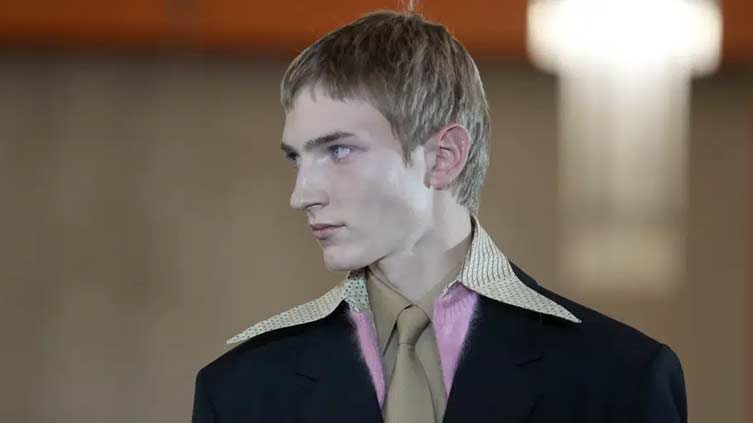Prada offers spare, cleansing looks at Milan Fashion Week

Entertainment
Prada offers spare, cleansing looks at Milan Fashion Week
MILAN (AP) — The Milan menswear runway was full of spare looks for next fall and winter, as if the fashion world is taking a deep breath, to see what happens next.
The color of the season: Black. The silhouette of the season: slim or relaxed, but mostly tailored. Bags: Utilitarian. Shoes: Oversized and sole gripping. Still, all of this utility was punctuated with romantic, feminine and even sexy gestures.
Here are some highlights from the third day Sunday of mostly menswear previews for fall-winter 2023, as many big brands seemed to be hitting the reset button:
PRADA’S RETRO-FUTURISM
The ceiling on the darkened Prada showroom rose to reveal industrial chandeliers as the first looks appeared on the runway: tailored, slightly blocky suit jackets with sharp, wing-like collars that flapped gently with each step, secured and cushioned by just a wisp of colorful knitwear.
The collars, reminiscent of the 1930s or 70s and in retro geometric prints, gave a romantic touch to an otherwise spare and cleansing collection by co-creative directors Miuccia Prada and Raf Simons.
“There is no space for useless creativity,” Prada summed up backstage.
The sharp collars, which appeared also on cardigans, are detachable, giving garments a longer life, and utility. On the runway, they were sexily styled without shirts.
The pair continued their exploration of uniforms, the sort that exemplify the value of working and not projecting authority. In that vein, suede tunics with matching overcoats recalled an artisan’s apron, worn with a shirt and tie to emphasize the virtue of work, and over the season’s slim trousers.
The clean looks and minimalist tailoring had an intentional retro-futuristic feel, that Simons defined as “very Prada, in my opinion.”
Puffer coats had a rotund shape. Quilted T-shirts kept the torso warm under overcoats. Shoes were thick-soled lace-ups with raised piping. Bags were slim document or computer bags, with a thermos slot.
Suiting was mostly black or gray, with separates providing color: trousers in red or green, cerulean blazers, yellow and pink cardigans.
Even the venue at the Fondazione Prada was stripped of artifice, down to the concrete floors and walls and ceiling, which dropped back down as the models left the runway.
Outside, hundreds of screaming K-Pop fans greeted the Enhypen band as they arrived for the show, and a few were rewarded with selfies afterward.
SIMON CRACKER PAYS TRIBUTE TO VIVIENNE WESTWOOD
The designers behind the Simon Cracker brand paid tribute to Vivienne Westwood’s legacy during a runway show presenting their latest collection of upcycled garments.
“We are here thanks to her. She was the first to make garments from upcycling,” said Filippo Biraghi, who founded Simon Cracker with Simone Botte in 2010.
“We studied her, we wore her, we lived her and we feel allied,″ Biraghi said of the British designer who died last month at 81. “She used fashion to protest, as a language of protest, for her entire history.”
Following in Westwood’s upcycling footsteps, the designers collect unclaimed garments from drycleaners and textile remnants from producers to make their unique creations.
In this punk-inspired collection, each garment is one-of-a-kind, promoting nonconformity. Caps served as epaulets on jacket shoulders; a mini-skirt was fashioned from tiered ruffles in the front and netting in the back; handmade blankets became overcoats. Knitwear was made from recovered yarn and in collaboration with designer Gaia Segattini.
In the spirit of Westwood, the show closed with a model swathed in a tulle garment with the words: “Demand the Impossible,” emblazoned on the front. The garment was a collaboration with Jamie Reid, the art director of the Sex Pistols, who donated clothes from his “Ragged Kingdom brand,″ for the final looks.
For the finale, all the models wore photos of Westwood around their necks. Biraghi, who wore a T-shirt picturing a joyful Westwood on the front, turned to reveal another image of her scowling on the back.
The designers said their messaging, one that has been with them since the brand’s inception, has grown more urgent, citing the danger to the planet and “the system’s mockery.”
“There is something wrong if you are not pissed off today,” Biraghi said.
CHARLES JEFFREY LOVERBOY’S IMAGINED WORLDS
Charles Jeffrey Loverboy, the label of the self-proclaimed club kid and Scottish-born designer Charles Jeffrey, brought joy to the Milan runway with fanciful storytelling though knitwear, kilting and prints.
Jeffrey presented his “Engine Room” collection through three subcultures in a mythical floating city: workers, whose toil keeps the city aloft; posers, or former workers who now bask in luxury; and snakes, aka, the media. While other brands hewed toward the minimal, Jeffrey went maximal, with a focus on sartorial details and an explosion of color.
The workers were clothed in gray, black and white, faces smudged, with starry prints and clawed footwear. Posers burst with color, including graphic prints from the archives of the Scottish artist and playwright John Byrne, metallic accents and endearing knitwear with kwai detailing like hoods with ears. The snakes had a Goth edge, dark garments giving way to newsprint prints against a black-white-and-red (read) palette.
Jeffrey called the collection “a celebration of Scotland, workers and Renaissance people.”

